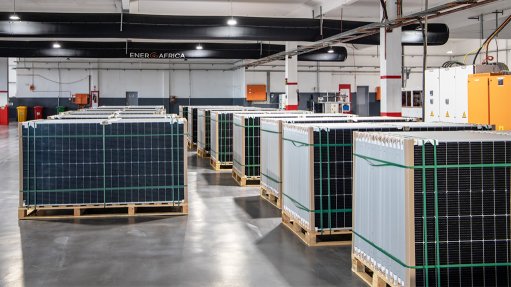Recycling economy initiatives create value
Although South Africa is leading the African continent in terms of waste management and recycling, the unauthorised disposal of waste and littering is still rampant, says Zero Waste operations director Hein Fourie, adding that this has led to lower-income groups becoming waste pickers to sort through waste and transport it to buy-back centres to earn money.
He notes that many recyclable materials have high recycling value. Consequently, many producer responsibility organisations (PROs) see the value in establishing buy-back centres, because these can significantly impact on the livelihoods of the poor and the unemployed, who are able to return recyclables in exchange for digital payments, vouchers or coupons that can be used to buy groceries.
These facilities can also result in more income generation through satellite sites at various locations.
“It’s an enabler to recover more waste, especially the difficult waste that is not being formally collected. There is also an industry-backed initiative, a voluntary system for large corporations to commit to, which includes the incorporation of recycled materials into either packaging or products produced by the plastics industry.”
Fourie adds that these initiatives are currently only in their infancy, but are going to result in a future where companies will commit to creating “a world without waste”.
Almost 20% of plastics used are being recycled, as are glass, metal, paper and cardboard, which are the five major waste streams produced in South Africa.
PRO and extended producer responsibility scheme administrator PETCO is trialling different technologies – including funding these technologies to encourage more companies to incorporate more recyclables in their products and subsequently reduce waste.
An initiative currently being undertaken by beverage giant Coca-Cola, aims to recycle the same number of polyethylene terephthalate bottles as the number sold in South Africa by 2028, which will have a net effect of producing zero waste.
Zero Waste to Landfills
Fourie says that South Africa’s meeting the zero-waste-to-landfill goal by 2030 is unachievable because it takes about five years to implement projects that can ensure that a facility is capable of meeting the goal.
Less than half of the estimated 100-million tonnes a year of waste produced in the country is diverted to landfills.
“If that target was a much more realistic goal – aiming for 2050 – that would be achievable.”
He adds that, Zero Waste is busy with waste to energy, which takes all the waste that cannot be recycled into account.
“Given the energy crisis, waste-to-energy initiatives would definitely contribute towards diverting waste away from landfills, but it will take time and significant investment in infrastructure to actually implement those projects.”
Fourie adds that using filled-up landfills requires the consideration of two aspects: harvesting landfill gas to produce energy because it is a commodity and one that can be leveraged to solve the energy crisis in the country.
Moreover, waste pickers are living at public landfills, and some are even third-generation waste pickers. Although they are denied access to private landfills because these are well managed, it is not the case at public landfills, owing to a lack of infrastructure and the resources needed to manage access.
“The South African government is trying to engage with informal and landfill pickers to try to give them a voice by recognising their positive impact on waste management and make them part of the solution. It is a significant problem and I think that government is trying to do its best in addressing the problem, but it’s not a simple solution,” Fourie says.
Article Enquiry
Email Article
Save Article
Feedback
To advertise email advertising@creamermedia.co.za or click here
Announcements
What's On
Subscribe to improve your user experience...
Option 1 (equivalent of R125 a month):
Receive a weekly copy of Creamer Media's Engineering News & Mining Weekly magazine
(print copy for those in South Africa and e-magazine for those outside of South Africa)
Receive daily email newsletters
Access to full search results
Access archive of magazine back copies
Access to Projects in Progress
Access to ONE Research Report of your choice in PDF format
Option 2 (equivalent of R375 a month):
All benefits from Option 1
PLUS
Access to Creamer Media's Research Channel Africa for ALL Research Reports, in PDF format, on various industrial and mining sectors
including Electricity; Water; Energy Transition; Hydrogen; Roads, Rail and Ports; Coal; Gold; Platinum; Battery Metals; etc.
Already a subscriber?
Forgotten your password?
Receive weekly copy of Creamer Media's Engineering News & Mining Weekly magazine (print copy for those in South Africa and e-magazine for those outside of South Africa)
➕
Recieve daily email newsletters
➕
Access to full search results
➕
Access archive of magazine back copies
➕
Access to Projects in Progress
➕
Access to ONE Research Report of your choice in PDF format
RESEARCH CHANNEL AFRICA
R4500 (equivalent of R375 a month)
SUBSCRIBEAll benefits from Option 1
➕
Access to Creamer Media's Research Channel Africa for ALL Research Reports on various industrial and mining sectors, in PDF format, including on:
Electricity
➕
Water
➕
Energy Transition
➕
Hydrogen
➕
Roads, Rail and Ports
➕
Coal
➕
Gold
➕
Platinum
➕
Battery Metals
➕
etc.
Receive all benefits from Option 1 or Option 2 delivered to numerous people at your company
➕
Multiple User names and Passwords for simultaneous log-ins
➕
Intranet integration access to all in your organisation

















